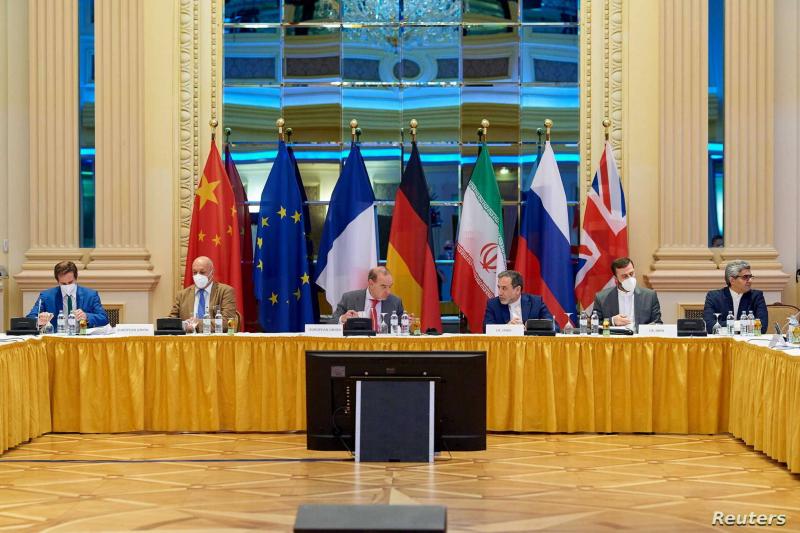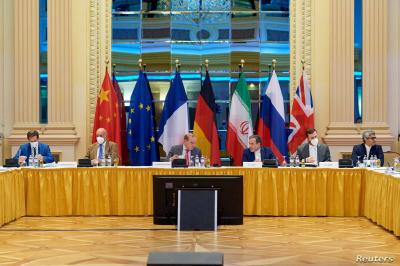Diplomats told Reuters that a U.S.-Iranian agreement is taking shape to revive the 2015 nuclear deal, outlining reciprocal steps from both sides in phases, leading to full compliance. However, the initial steps do not include exemptions from oil sanctions.
Delegates from Iran, Russia, China, Britain, France, Germany, the European Union, and the United States continue to negotiate details amidst Western warnings that time is running out before the original agreement becomes obsolete. The delegates note that a significant portion of the draft text has been settled, but some contentious issues remain.
The overarching goal is to return to the original deal, which exchanges the lifting of sanctions, including restrictions that cut down Iran's critical oil sales, for limits on its nuclear activities and extends the timeframe for Tehran to produce enough enriched uranium to make a nuclear bomb, should it choose to do so.
Iran has violated many of these restrictions and has significantly deviated in response to the U.S. withdrawal from the agreement in 2018 and the reinstatement of sanctions under former President Donald Trump. While the 2015 deal limited uranium enrichment to a purity of 3.67%, Iran is now enriching up to 60%, a threshold close to what is required for weapons.
Iran asserts that its goals are entirely peaceful and that it seeks nuclear technology for civilian uses. In contrast, Western powers point out that no nation has reached this level of enrichment without developing nuclear weapons, and Iran's progress since the U.S. withdrawal means that the 2015 agreement will soon be rendered meaningless.
The draft agreement, which is over 20 pages long, stipulates a set of steps to be implemented once ratified, starting with a phase that includes Iran suspending enrichment above 5%, according to three diplomats familiar with the negotiations.
The text also includes references to other measures, which diplomats say involve unfreezing approximately $7 billion of Iranian funds frozen in South Korean banks due to U.S. sanctions, as well as the release of Western prisoners held in Iran, a measure described by chief U.S. negotiator Robert Malley as a condition for sealing an agreement.
Once this initial set of actions is executed and verified, the main phase for lifting sanctions begins, culminating in what many diplomats refer to as the "reapplication day."
Diplomats note that the duration of these phases remains undecided, with the text indicating an "X" marker as a placeholder during significant days, such as "reapplication day." Officials estimate the period from the agreement to "reapplication day" to range from one to three months.
They indicated that Iran would return to basic limits, such as a maximum enrichment level of 3.67%.
Similar to the original agreement officially known as the Joint Comprehensive Plan of Action, the new agreement requires that the U.S. grant the oil sector, a lifeline for Iran, exemptions from imposed sanctions rather than complete relief, necessitating renewals every few months.
A Middle Eastern diplomat familiar with the talks remarked that regarding oil exports, under the agreement, former U.S. Presidents Barack Obama and Trump granted waivers lasting 90 to 120 days, renewing them continuously until Trump ceased the renewals after withdrawing from the agreement.
Diplomats involved in the discussions, which began ten months ago, state that it remains unclear whether an agreement will actually be reached, citing the saying that there is "no agreement on anything until there is an agreement on everything."
French Foreign Minister Jean-Yves Le Drian stated yesterday (Wednesday) that Iran must decide within days whether to seize the opportunity, with other officials noting that the upcoming days will be crucial.
Another unresolved issue is Iran's request for assurances that the U.S. will not withdraw from the agreement again. In this regard, Western officials maintain that it is impossible to provide strong guarantees given the difficulty of binding future governments.
Nonetheless, a Middle Eastern diplomat and an Iranian official indicated that Tehran is prepared to accept a less strict measure by stipulating that if the U.S. violates the agreement, Iran is allowed to enrich up to 60%.
There had previously been a disagreement between Iran and Western powers over whether the U.S. withdrawal grants Iran the right to violate the agreement under the original text, as Tehran did, as well as over the definition of what constitutes a violation.
Several diplomats indicated that lifting some particularly sensitive sanctions might also require a face-to-face meeting between Iranian and U.S. officials. Iran has so far rejected holding direct meetings, and officials from Iran and the Middle East stated that such a move would take place at the end of negotiations.




